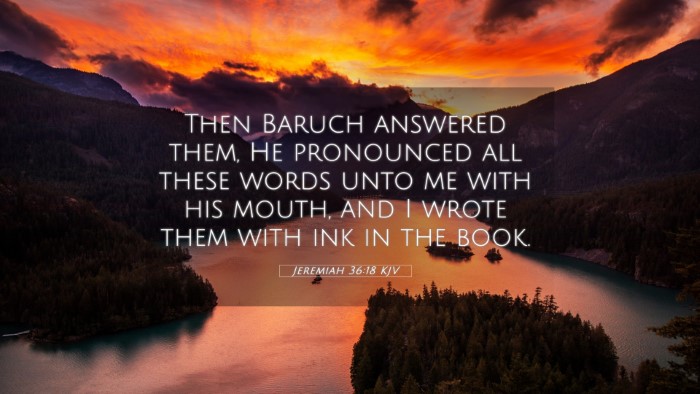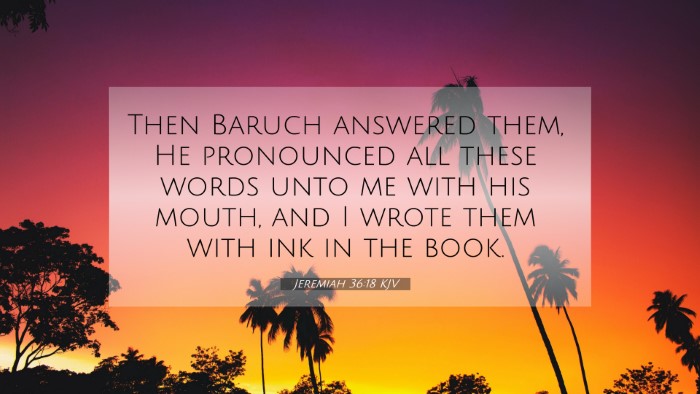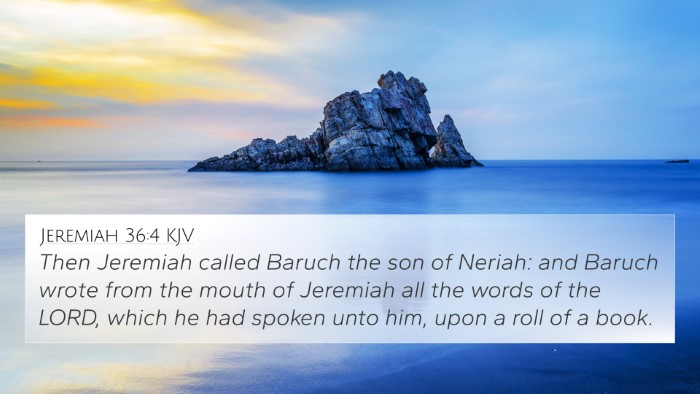Understanding Jeremiah 36:18
Jeremiah 36:18 states: "Then Baruch answered them, He pronounced all these words unto me with his mouth, and I wrote them with ink in the book." This verse highlights the role of Baruch as the scribe for the prophet Jeremiah and underscores the importance of written prophecies.
Contextual Overview
The context of Jeremiah 36 reveals the political and spiritual turmoil in Judah during the prophet's ministry. The Babylonians were a looming threat, and Jeremiah's messages were meant to guide the people toward repentance and awareness of God's judgment.
Verse Analysis
Baruch serves as a crucial figure in the transmission of God's word as he physically records the prophet's declarations. This illustrates several key aspects:
- The Importance of Scripture: The act of writing down the prophecies signifies the permanence of God's messages and the need for accurate preservation of divine revelation.
- Collaboration in Prophecy: Baruch's role demonstrates how God's work often involves multiple individuals, emphasizing community in spiritual endeavors.
Insights from Public Domain Commentaries
Matthew Henry's Commentary
Matthew Henry suggests that this verse reveals Baruch's obedience and faithfulness to the prophetic task. He notes that Baruch not only records the words but does so as a servant of the Lord, which underscores the dual role of both prophecy and service to God.
Albert Barnes' Notes
Albert Barnes emphasizes the significance of Baruch's work in preserving the messages of Jeremiah, noting that the written word serves as a testament and is crucial for future generations. He connects this action to the broader theme of God's continuous communication with His people throughout history.
Adam Clarke's Commentary
Adam Clarke notes that Baruch's scribing signifies a vital connection between the spoken and written word of God. He infers that the act was not merely a task but a sacred responsibility to ensure God's revelations were available for reflection and guidance, suggesting an ongoing relationship with God's word.
Cross-References
This verse relates to several other scriptural passages that enhance our understanding of God’s revelation:
- Exodus 17:14 - God instructs Moses to write down what He says, highlighting the command to document divine instructions.
- Isaiah 8:1 - The act of writing in a large tablet emphasizes the clarity needed in sharing prophetic messages.
- Habakkuk 2:2 - Here, God commands writing the vision plainly, reinforcing the written word's role in proclaiming God’s will.
- Jeremiah 30:2 - God exhorts Jeremiah to write down all that He speaks, ensuring clarity and continuity of the message.
- 2 Timothy 3:16 - This New Testament passage affirms that all Scripture is God-breathed, extending the relevance of such writings over time.
- Revelation 1:11 - The command to write what is seen underscores the significance of documenting God’s revelations.
- Luke 1:3 - This verse talks about compiling an orderly account of events based on the testimony, reflecting the importance of written histories in faith.
Thematic Bible Verse Connections
Jeremiah 36:18 engages with several broader themes in scripture, such as:
- Divine Communication: The ongoing dialogue between God and humanity.
- Human Responsibility: The role individuals play in sharing God’s message through various means.
- The Preservation of Truth: The importance of documenting revelations to maintain doctrinal integrity.
Conclusions on Cross-Referencing
Through utilizing tools for Bible cross-referencing, such as a bible concordance or a bible cross-reference guide, readers can explore the intricate web of connections between verses like Jeremiah 36:18 and other scriptural passages. These connections enrich understanding and insight into God’s intentions throughout the Scripture.
Further Study and Application
In exploring the relationships between various scriptures, we see that understanding one verse often necessitates examining others. For instance:
Consider how to find cross-references in the Bible can help in identifying connections between the Old and New Testament, enriching one’s study through a comparative analysis.
Engagement with the Text
As you study Jeremiah 36:18 and its related verses, reflect on:
- What verses are related to this passage?
- How do the insights from Baruch's role inform your understanding of scripture?
- What themes emerge that connect Jeremiah's prophecies to New Testament teachings?
In conclusion, the emphasis on recording God's words in Jeremiah 36:18 serves as a template for understanding how both written and spoken revelations shape our faith. Engaging with and cross-referencing these texts can lead to a deeper appreciation of scripture overall.






